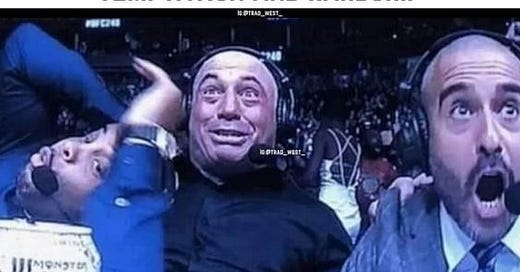I am reading finance blogger
's book, Self-Reliance in the 21st Century, and his concept of self-reliance differs from Ralph Waldo Emerson's call to resist conformity. Smith advocates for reducing one's supply chain dependency while cultivating "trusted personal networks." This passage particularly struck me:"Humans are prone to recency bias: we believe that the recent past is a reliable guide to the future. The past 75 years of abundance, stability and reliable weather have lulled us into thinking that abundance, stability and good weather are permanent. We are learning these were all temporary."
Smith argues that the age of superabundance is not a birthright, yet those privileged enough to enjoy its advantages behave as it is. There is an alternative perspective: superabundance will be our birthright, and we must embrace the "techno-capital machine"1 to get us there. This premise is from
's “The Techno-Optimist Manifesto,” which presents the case that technological progress will lead to material abundance for all.2Concerning superabundance, Smith and Andreessen offer two competing futures:
The supply chains and the complex systems we depend on will continue to unravel, ending the age of superabundance.
A “eucatastrophe”3 will happen from technological innovation, leading to superabundance for all.
When faced with multiple contradicting futures, I look for any shared virtues needed for each. I see virtues as values that are always good. Wisdom is good because it makes the way toward the good clear. Courage is good because it allows one to move toward the good when fear is present. Temperance is good because it allows moderation in things that tempt us away from the good.
I have been focusing on these three cardinal virtues ever since becoming "wisdom pilled," and I have been focusing more on temperance as of late. The precarity of superabundance has something to do with this focus. Whether the era of superabundance is ending or just beginning, temperance remains essential in both futures.
In the former, those slavishly dependent on the system, both materially and psychologically, are in for a rude awakening when goods become increasingly less available. Temperance training can steel one against this lack. In the latter, an AI-stirred superabundance can provide an abundance of distractions4, creating greater traps to ensnare people's potentialities. Temperance training can steel one against this distractive onslaught.
For me, the less challenging temptations are the ones where it is wise to eliminate them entirely.5 The most vexing ones are those where it's not wise to remove them entirely but rather to find an optimal grip to handle them6. I have come to understand that temperance involves more than just saying no to things and entails developing a nuanced relationship with what entangles us.
I do not know what the future holds, but I choose to see this moment as fertile ground for cultivating virtue.
I’ll consider sharing a “living question” - a question one lives with without forcing an answer - at the end of my entries, inviting others to live with them as well. Here is one today: What is the less foolish way to engage in temperance training? Leave a comment if you have an answer.
In my philosophy practice, I stay with the living questions of others. To see if there are any openings for long-term inquiry partnerships, contact me at thestoa at protonmail dot com. You can read more about my practice here or here.
To all those who are new to this Substack, a warm welcome. Less Foolish is primarily funded by its readers, and I endeavor to keep most of the content accessible to everyone. If you wish to contribute to my work, you might consider subscribing, whether for free or as a paid member, and sharing this post with those you sense will resonate.
“Combine technology and markets and you get what Nick Land has termed the techno-capital machine, the engine of perpetual material creation, growth, and abundance.” - Marc Andreessen, “The Techno-Optimist Manifesto”
“An existential eucatastrophe is an event which causes there to be much more expected value after the event than before.” - Owen Cotton-Barratt & Toby Ord, “Existential Risk and Existential Hope: Definitions”
A virtual reality more scintillating than reality being one of the distractions.
I cut out alcohol and gluten in October and have not engaged in either since, nor do I feel particularly tempted to. See the “Year of Temperance” entry.
“Screen time” is currently my biggest temperance challenge.




